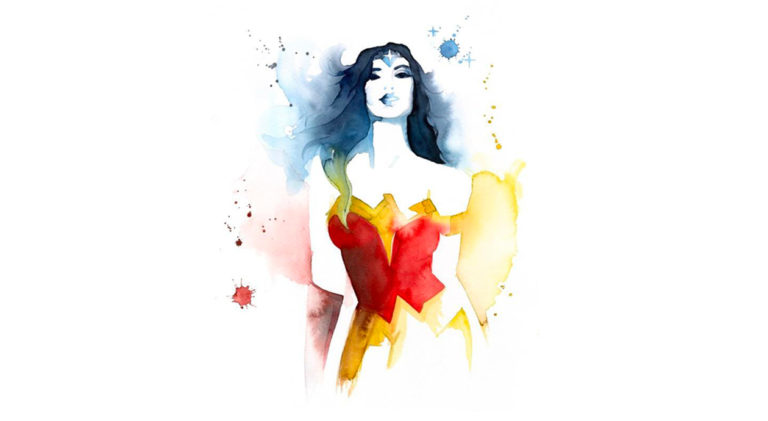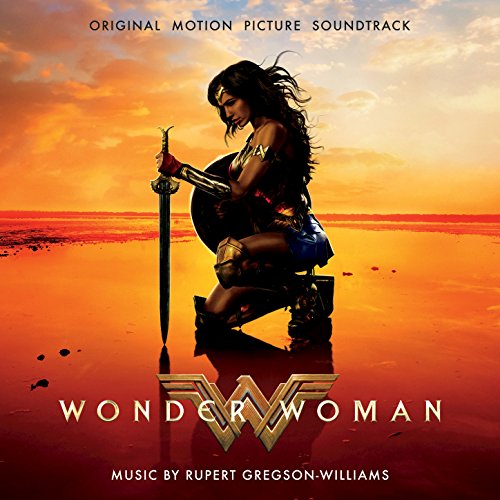Jacki Zehner
Wonder Woman
From bodybuilding to thriving in the male-dominated Goldman Sachs, Jacki Zehner turned to Wonder Woman to become the leader she is today. In leading a campaign to bring her hero to the big screen, Jacki embodied the power of women to change the world.

Image by Clémentine.
Guest

Jacki Zehner Jacki Zehner is the co-founder and member of Women Moving Millions as well as the president of The Jacquelyn and Gregory Zehner Foundation. She used to be a bodybuilder and was the youngest woman and first female trader to make partner at Goldman Sachs.
Transcript
Lily Percy, host: Hello, fellow movie fans. I’m Lily Percy, and I’ll be your guide this week as I talk with Jacki Zehner about the movie that changed her life, Wonder Woman. Just a reminder that if you haven’t seen it, don’t worry, we’re going to give you all the details you’ll need to follow along.
[music: “Wonder Woman’s Wrath” by Rupert Gregson-Williams]
I’ve never watched a movie where I wanted to stand up and cheer after only seeing five minutes of it. That’s the experience I had when I watched Wonder Woman. I’d never seen so many women kicking so much ass and also just never seen so many women with each other for five minutes and there just weren’t men around; there was this island where women were allowed to be strong and powerful and vulnerable at the same time. And I wanted to celebrate that. I’m actually really surprised that I didn’t stand up and cheer.
[excerpt: Wonder Woman]
Wonder Woman tells the story of Diana Prince, played by Gal Gadot, and it’s an origin story. You learn all about this idyllic island of women that she grows up on, and there’s all this back story to Zeus and Greek mythology that I won’t go into. But what you really need to know is that her world is rocked by the arrival of Steve Trevor. Steve Trevor is an American pilot and spy played by Chris Pine. He crashes onto the island where Diana Prince is and that’s how she ends up getting sucked into World War I.
[excerpt: Wonder Woman]
For women who grew up watching Wonder Woman on television in the ’80s, as she was played by Lynda Carter, you know she’s been a figure that has meant strength and independence and often was the only portrayal of a woman hero that we could really call to. And that meant a lot to Jacki Zehner. She was the first woman trader to become partner at Goldman Sachs, the investment banking firm, and she was often the only woman in the room for many, many years. During that time, Wonder Woman is someone she kept coming back to and she really became Wonder Woman’s number one fan. So much so, that she even wrote a 70-page report campaigning for the life story of Wonder Woman to be made into its own action movie.
[music: “Amazons of Themyscira” by Rupert Gregson-Williams]
Ms. Percy: One of the things that I love about your life with Wonder Woman has been how you started out as a fan of her as a character on the TV show, as a little girl, but then she was with you through becoming a bodybuilder in Canada. You were 16, and you won the Canadian Junior Bodybuilding Championship. Was that part of the inspiration for that, as well?
Jacki Zehner: Sometimes, I think, when you look back on your life, you only see the connections clearly in hindsight, in the rearview mirror.
Ms. Percy: Of course.
Ms. Zehner: But I do think that was so influential for me. I grew up — and obviously, this next generation of girls are gonna have this character. But when she was on air, basically between ’75 and ’79, I was between 11 and 15 years old. It was just in that window. This would be the days where, at least, where I grew up, we literally had three channels. So she was present for me in those formative years. They say those are the formative years for girls, the years where you either tend to go back and sit in the back of the room, or not. And seeing a character that was my favorite character, that was strong and powerful and a force, I think, helped me make choices I might not otherwise have made. And I choose to become a bodybuilder, of all things, in the 19 — oh, gosh, I want to say ’80s. I can’t believe that.
Ms. Percy: We won’t fact check that.
Ms. Zehner: So she can take full credit for that, yes.
Ms. Percy: One of my favorite movie writers is this writer, Angelica Bastien. She’s amazing. And in her review of Wonder Woman for rogerebert.com, she wrote this incredible description of the movie that I just want to read to you, because I think you’ll appreciate it. She says, “Wonder Woman has always been at her best when her stories lean into the feminist ethos at her core. When artists treat her compassion as the key to understanding her, rather than her brutality in battle, audiences are privy to a superhero who offers what no other can: a power fantasy that privileges the interiority and desires of women.”
And I love that idea, because when I saw Wonder Woman, that’s what I felt. I thought, this woman is so strong and powerful, but she’s also feminine, right? She’s so vulnerable, at the same time, and compassionate all the way through.
Ms. Zehner: I could not agree more. And I think a superhero doesn’t just show up, guns a-blazing, killing people. “What is a superhero?” is, to me, so critical to the questions that come out of this film, or the answers provided by this film. And with this character, yes, she’s strong. Yes, she does what she needs to do in the moment to move towards a more just world, but she also does it with so much compassion. And there are so many moments in that film where she just doesn’t rush to take someone’s head off. She rushes into this idea that the superhero power is that of compassion and caring for the world and using your power to help and serve others.
[excerpt: Wonder Woman]
Ms. Percy: While you were campaigning for this movie to be made, you wrote this really beautiful piece in 2013, called “Why No Wonder Woman?” There’s this really lovely quote that I think goes along with what you just said, which is, you said: “I believe in the story of Wonder Woman. I always have. Not the literal baby-being-made-from-clay story, but the metaphorical one. I believe in a story where a woman is the hero and not the victim. I believe in a story where a woman is strong and not weak. Where a woman can fall in love with a man, but she doesn’t need a man. Where a woman can stand on her own two feet. And above all else, I believe in a story where a woman has superpowers that she uses to help others, and yes, I believe that a woman can help save the world.”
And that’s what we see in the movie, which we, quite frankly, haven’t ever seen before, when I think about female superheroes or action stars. That’s just not something that we’ve been given the opportunity to portray.
Ms. Zehner: Absolutely. The core of Wonder Woman is love, is purpose, is compassion, is doing the right thing. I love this saying — my friend, Kathy LeMay, says this: “Do the next right thing.” And that’s this character. She’s always attentive to this in every moment. She’s not saying, “Let’s forget about that person, because I can go save 100 down the road.” She doesn’t want to walk by any suffering. She just pays attention to it, she’s in the moment with it, and she gives us a sign that helping one person, saving one person, can be as important as saving the world.
[excerpt: Wonder Woman]
Ms. Percy: I love that you’re talking about her motivations being different from the other men, the soldiers in the movie that she fights alongside and is trying to save the world with. Her motivations come from this really pure place, because she grew up in an environment where she was loved and had confidence and was supported; and I think that that’s actually — my favorite scenes in the movie are all the first 20 minutes, because it’s this world where women are together and are training each other and are supporting each other, and they are just a community of women. And watching it, I go back to it again and again in my mind, how very few times we see that — where we’re allowed to be in community together, and it’s not gossiping or seen in a negative way. It’s just this really beautiful utopia, almost.
Ms. Zehner: I could not agree more. The opening scene, where they’re on the island, and they’re not sitting around, drinking tea and knitting…
Ms. Percy: Talking about men…
Ms. Zehner: [laughs] …or to your point, gossiping. There’s none of that. And…
Ms. Percy: They’re getting shit done. [laughs]
Ms. Zehner: They are, and they’re training. They’re in it. I’m like, how long have they been doing this? My mind’s like, “1,000 years? How long have they been, literally, in the bubble?” But I agree. We have not seen that, really, onscreen, and that sense of feminine energy. I think of that bubble that surrounds the island, almost like a womb that is holding this feminine energy that is gonna be let loose on the world.
And I have so many questions for Patty Jenkins and the writers, if we were ever having a cocktail together. But this idea that when — they hint about this — when she comes into her power, that’s when the bubble is pierced, with this idea that the rise of feminine energy and power will not be met without pushback, without conflict. And I think — again, thinking about not only the film, Wonder Woman, in 2017, but the film now and in this moment, and how relevant this is — that the rise of the feminine doesn’t have to come with the fall of the masculine. And what are we saying about our culture and our society — to have, hopefully, balance, right? Because there are good men, which I love too, in this film; it’s not like they’re all bad guys. There are some really great guys; Steve Trevor, hello.
Ms. Percy: Exactly, and the men are represented in that way, in this movie.
Ms. Zehner: Absolutely, and she’s playful with her male characters. And they’re vulnerable, and they’re fun. And it’s not just what she does with the female characters, it’s what she does with the male characters, as well.
[excerpt: Wonder Woman]
Ms. Percy: I hope you’re enjoying this conversation with Jacki Zehner as much as I am. If you are, something that really helps us reach more listeners is if you subscribe on Apple Podcasts; leave us a review there if you’re feeling extra friendly. You can also get in touch with us on Facebook and Instagram @thismoviechangedme. On Twitter, we’re @TMCMpodcast. Tell us which movies have changed you, what you’re connecting with on the show, and what you wish we’d do differently. We love hearing from you.
[music: “Amazons of Themyscira” by Rupert Gregson-Williams]
Ms. Percy: I have to say, one of my favorite scenes in the movie is in the opening battle sequence when we see the Germans invade, pierce through the bubble, is seeing that scene when Robin Wright Penn’s character jumps on the shield and then leaps through the air and just shoots her bow and arrow, that was — I’m a moviegoer, and I have been to many, many action screenings, and I’ve never felt the desire to stand up and just yell, in, just, glee, as much as I did in that moment — because again, it’s this idea of strength and femininity all in one scene and one character.
Ms. Zehner: Yeah, I know. And again, back to the bodybuilding — [laughs] don’t all questions come back to that?
Ms. Percy: As they should. [laughs]
Ms. Zehner: It’s funny too, when I think of who I am as a person, I’ve always held those hand-in-hand. And I think that that’s been a battle within the feminist movement. The conversations on feminism can be around this idea that — what does that even mean? What does it mean to be a woman, to be a feminist, in that context? And I think we can hold both; women can be both strong and sensitive. And so can men.
That’s the paradigm shift I think we’re gonna witness in our lifetime, of which we may well look back and say, this film landed at a point in our culture where we’re really challenging this binary thinking; this idea of man/woman, good/bad, masculine/feminine, and realize that we’re much more around a spectrum. We’re all in a circle with one another, and not on a line.
Ms. Percy: God, I look forward to that time. I know we’re in it, but I really look forward to seeing it very visibly present. Let’s talk about the humor in the movie, because I know it’s something that both of us love. One of my favorite scenes is when Diana and Steve are in the boat together, and they’re talking about sex.
Ms. Zehner: Yes!
Ms. Percy: And she’s explaining to him how men are essential for procreation, but, when it comes to pleasure, unnecessary.
[excerpt: Wonder Woman]
Ms. Percy: [laughs] And the way she says that and delivers it is just so fabulous.
Ms. Zehner: Oh, my gosh, yes.
Ms. Percy: Tell me about the moments that you love, the moments that, when you saw this movie, really stood with you.
Ms. Zehner: Well, I love that moment. I have to say, so many funny moments, but when she lands in London, and they’re walking down the street, and they’re talking about holding hands and — all the ones that are little jabs at our culture. But she’s walking down the street, and then she sees a baby, and she’s like, “Baby!” And that was just like, we can be Wonder Woman and also freak out when we see a cute baby and need to hold it.
Ms. Percy: So true.
Ms. Zehner: And the other one, when she’s shopping for clothes with Etta, and they’re in the store — because even the choice to put that in there. Every woman I’ve probably met got a kick out of that. But she’s like, “How do you fight in this?” And Etta has this line, something about, “Well, sometimes we fight with our principles.” [laughs] I was cracking up.
Ms. Percy: Exactly. Etta, another one who has great lines, because she has that whole secretary comment.
[excerpt: Wonder Woman]
Ms. Zehner: There are so many of those little jabs, so the film, even though it’s serious and heavy — and again, I think a lot more of the superhero movies are moving in that direction. The latest Thor movie was certainly, definitely in that direction. But they don’t take themselves too seriously all the time, and they camp it up a little bit. And you just have those laugh-out-loud moments. They go away as, I guess, the film gets a little more intense, but we’re still talking about it, right? We love those lines. They make a difference.
Ms. Percy: They really do. I love the way that Wonder Woman ends. Speaking of lines, these poetic and insightful words from Diana Prince, from Wonder Woman herself. And she says, in voiceover: “I used to want to save the world, to end war and bring peace to mankind. But then I glimpsed the darkness that lives within their light and learned that inside every one of them, there will always be both, a choice each must make for themselves, something no hero will ever defeat. And now I know that only love can truly save the world. So I stay, I fight, and I give for the world I know can be. This is my mission now, forever.”
Ms. Zehner: Yes, and it’s such a call to action, for all of us. That’s again, what I — this film is just everything right, because you’re not walking away, going, “Well, that was a great two hours, and that popcorn was yummy.” You’re really left, going, “I’m a superhero. I can kick some serious ass here. I can make a difference. I can do something.” And I don’t recall feeling that way after any other superhero movie.
Ms. Percy: No.
Ms. Zehner: It’s so intentional, and it’s so — that choice to end it with the call to action. And I’ve seen the film a few times in theaters, and people burst out in applause, and they’re walking out smiling, and you’re walking out wanting to do something for the world. That movie, I guarantee, has made countless people do something nice, something kind, something actionable to make the world a better place.
Ms. Percy: Yeah. If we got all of the earth’s women together and just showed us this movie on a loop, no one can stop us.
Ms. Zehner: Isn’t that true?
Ms. Percy: [laughs] Just good luck trying.
Ms. Zehner: You referenced this report I wrote a long time ago, when I was launching this campaign to have Wonder Woman come to the big screen. And I collect quotes; I’m like #quotegirl. And at the end of this essay, I have this quote, which is one of my favorites, which is, “If ever the world sees a time when women will come together purely for the good of humanity, it will be a power as the world has never seen.” That’s a great quote, right? But here’s the punchline: It was written by a man, Matthew Arnold, circa 1800.
Ms. Percy: Wow.
Ms. Zehner: To me, that’s the work I do in the world — is trying to support women coming into their power, to help other women. That’s the work I do in the world. And that’s one of my favorite quotes to hang on to and to see this idea that that is the movement around this movie, is about us all stepping into our power, whatever that might mean for us, and using all those powers — power to, not power over — to help make the world a better place.
[excerpt: Wonder Woman]
[music: “Wonder Woman’s Wrath” by Rupert Gregson-Willams]
Ms. Percy: Jacki Zehner is a real-life Wonder Woman and the co-founder of Women Moving Millions. She is the president of The Jacquelyn and Gregory Zehner Foundation and dedicates all of her time and resources towards the advancement of women and girls. Learn more about her mission and her passion for Diana Prince at jackizehner.com.
Next time I’m going to be talking with Song Exploder’s Hrishikesh Hirway about his life-changing movie, You Can Count On Me. If you’re close with a brother or sister there’s a good chance you’ll connect strongly with this one. And it stars the dream team of Mark Ruffalo and Laura Linney, so what’s not to love? Find it streaming in all the usual places or at your local library.
This Movie Changed Me is produced by Maia Tarrell, Chris Heagle, Tony Liu, and Marie Sambilay, and is an On Being Studios production.
I’m Lily Percy, be your own superhero: Step into your power and make the world a better place.








Reflections